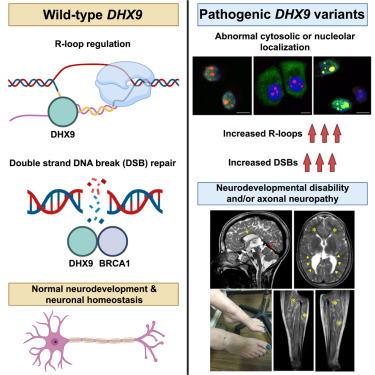Research by Prof. Linda Gu Shen and Prof. Albert Cheung Hoi-hung reveals for the first time that pathogenic variants in DHX9 disrupted the gene’s normal function
Neurodevelopmental disorders represent a spectrum of diseases, from mild to severe, that affect brain functions and neurological development. Some common examples include autism spectrum disorder, attention deficit hyperactivity disorder (ADHD) and intellectual disability. These developmental issues are estimated to affect 15-20% of children, making them a prevalent concern during childhood and adolescence worldwide.
Due to an increasing amount of evidence linking defects in DHX genes to neurodevelopmental disorders, an international team of researchers from The Chinese University of Hong Kong (CUHK)’s Faculty of Medicine (CU Medicine), Baylor College of Medicine and the German Mouse Clinic collaborated on a study of the pathogenesis of patients with neurodevelopmental disorders. The research team comprising the School of Biomedical Sciences (SBS) members Assistant Professors Linda Gu Shen and Albert Cheung Hoi-hung and other researchers revealed for the first time that pathogenic variants in DHX9 disrupted the gene’s normal function. Further study using cellular and animal models supported the conclusion that defective changes in DHX9 underlie human neurodevelopmental problems. This is the first time that this gene has been associated with a human disease. The findings have been published in the American Journal of Human Genetics.
DHX9 encodes a helicase, an enzyme that plays a critical role in many cellular processes, including regulating DNA replication and RNA transcription, and maintaining genomic stability. Dysregulation of these processes is involved in disease mechanisms that result in neurodevelopmental disorders. The research team provided a genetic diagnosis to a group of 20 patients with undiagnosed neurodevelopmental disorders ranging from severe to mild, all with pathogenic changes to this gene.
To understand how patient-specific variants of the gene can cause defects, the team conducted cell-based functional studies. Cellular studies demonstrated that pathogenic DHX9 variants could modify the subcellular localisation of its expressed protein, increase genome instability and, in some cases, alter helicase ATPase activity, which are all key functions of the gene.
The related coverage by the Communications and Public Relations Office, CUHK and CU Medicine can be viewed HERE and HERE respectively,


Researchers from the School of Biomedical Sciences include (back row, from left) Assistant Professor Albert Cheung Hoi-hung, Assistant Professor Linda Gu Shen and PhD. Student Ms. Cheryl Chen Wang; (front row, from left) research assistant Ms. Lily Liu Lingxiao and PhD. student Ms. Ava Guo Tianyu
神經發育障礙泛指多種影響大腦功能和神經發育的疾病,病情可分輕微至嚴重程度,較常見的疾病包括自閉症譜系障礙、注意力不足過動症(ADHD)及智力障礙。據估計,全球約有15%至20%兒童出現不同程度的神經發育障礙,是全球關注的兒童及青少年健康發展議題。
過去有研究指出神經發育障礙與DHX家族基因變異有關。香港中文大學(中大)醫學院早前與美國貝勒醫學院(Baylor College of Medicine)及 德國小鼠中心(German Mouse Clinic)合作研究,生物醫學學院助理教授顧燊教授及張凱鴻教授包括在內的團隊透過病人基因組測序分析,首次發現DHX9基因變異會造成遺傳疾病,並利用細胞及動物模型成功驗證DHX9基因功能缺陷與神經發育障礙相關。研究結果已在科學期刊《美國人類遺傳學雜誌》發表。
從基因和基因組變異角度研究神經系統疾病
DHX9基因編碼一種解旋酶,在許多細胞代謝過程中發揮關鍵作用,包括調節DNA複製、RNA轉錄等,有維護基因穩定性的功能。因此當DHX9出現變異,導致細胞生理過程失調,便有可能誘發神經發育障礙。研究團隊為出現輕微至嚴重程度神經發育障礙、但未經確診的患者佇列進行基因診斷,發現其中20名患者都帶有DHX9基因致病性變異。
他們進一步進行細胞研究,以瞭解DHX9基因變異如何導致功能改變。結果顯示,DHX9的致病性變異可以改變基因的多個關鍵功能,包括表達蛋白的亞細胞定位,增加基因組的不穩定性,或在某些情況下改變解旋酶的活性。
中大傳訊及公共關係處的有關報導請按此處瀏覽;而中大醫學院的報導可按此瀏覽。


生物醫學學院研究團隊成員包括(後排左起)助理教授張凱鴻教授、助理教授顧燊教授、博士生王晨女士、(前排左起)研究助理劉凌霄女士和博士生郭恬語女士
神经发育障碍泛指多种影响大脑功能和神经发育的疾病,病情可分轻微至严重程度,较常见的疾病包括自闭症谱系障碍、注意力不足过动症(ADHD)及智力障碍。据估计,全球约有15%至20%儿童出现不同程度的神经发育障碍,是全球关注的儿童及青少年健康发展议题。
过去有研究指出神经发育障碍与DHX家族基因变异有关。香港中文大学(中大)医学院早前与美国贝勒医学院(Baylor College of Medicine)及德国小鼠中心(German Mouse Clinic)合作研究,生物医学学院助理教授顾燊教授及张凯鸿教授包括在内的团队透过病人基因组测序分析,首次发现DHX9基因变异会造成遗传疾病,并利用细胞及动物模型成功验证DHX9基因功能缺陷与神经发育障碍相关。研究结果已在科学期刊《美国人类遗传学杂志》发表。
从基因和基因组变异角度研究神经系统疾病
DHX9基因编码一种解旋酶,在许多细胞代谢过程中发挥关键作用,包括调节DNA复制、RNA转录等,有维护基因稳定性的功能。因此当DHX9出现变异,导致细胞生理过程失调,便有可能诱发神经发育障碍。研究团队为出现轻微至严重程度神经发育障碍、但未经确诊的患者伫列进行基因诊断,发现其中20名患者都带有DHX9基因致病性变异。
他们进一步进行细胞研究,以了解DHX9基因变异如何导致功能改变。结果显示,DHX9的致病性变异可以改变基因的多个关键功能,包括表达蛋白的亚细胞定位,增加基因组的不稳定性,或在某些情况下改变解旋酶的活性。
中大传讯及公共关系处的有关报导请按此处浏览;而中大医学院的报导可按此浏览。


生物医学学院研究团队成员包括(后排左起)助理教授张凯鸿教授、助理教授顾燊教授、博士生王晨女士、(前排左起)研究助理刘凌霄女士和博士生郭恬语女士



